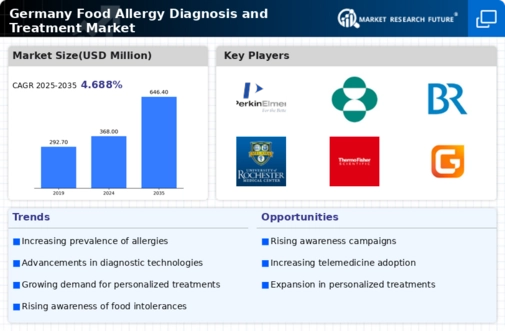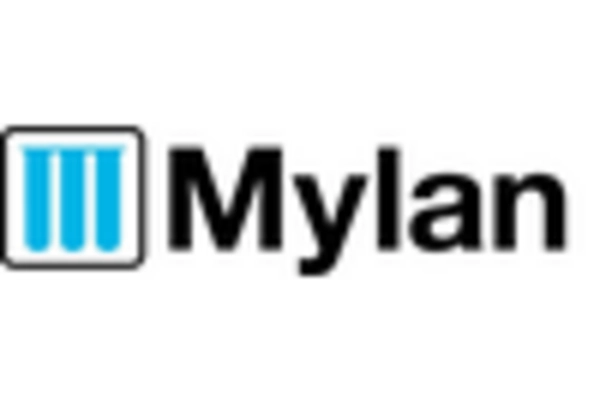Increasing Awareness of Food Allergies
The growing awareness surrounding food allergies in Germany is a pivotal driver for the The growing awareness surrounding food allergies in Germany is a pivotal driver for the Food Allergy Diagnosis and Treatment Market.. Educational campaigns and initiatives by health organizations have heightened public understanding of food allergies, leading to increased demand for diagnostic services and treatment options. As more individuals recognize the symptoms and risks associated with food allergies, the market experiences a surge in consultations and testing. This heightened awareness is reflected in the rising number of allergy tests conducted annually, which has reportedly increased by 15% over the past few years. Consequently, healthcare providers are adapting their services to meet this growing need, thereby expanding the food allergy-diagnosis-treatment market.
Regulatory Support for Allergy Management
Regulatory frameworks in Germany are increasingly supportive of food allergy management, which significantly influences the food allergy-diagnosis-treatment market. The German government has implemented policies aimed at improving food safety and allergen labeling, thereby fostering a safer environment for individuals with food allergies. These regulations not only enhance consumer confidence but also encourage manufacturers to develop innovative diagnostic and treatment solutions. For instance, the introduction of stricter labeling requirements has led to a 20% increase in the availability of allergen-free products, which in turn drives demand for diagnostic services to identify specific allergies. This regulatory support is crucial for the growth and sustainability of the food allergy-diagnosis-treatment market.
Technological Innovations in Allergy Testing
Technological advancements in allergy testing are transforming the food allergy-diagnosis-treatment market. Innovations such as molecular diagnostics and point-of-care testing are enhancing the accuracy and speed of allergy diagnoses. These technologies allow for more precise identification of allergens, which is essential for effective treatment planning. In Germany, the adoption of these advanced testing methods has been on the rise, with a reported increase of 30% in the use of molecular tests over the last two years. This trend not only improves patient outcomes but also stimulates market growth as healthcare providers seek to incorporate the latest technologies into their practices.
Rising Incidence of Food Allergies in Children
The increasing incidence of food allergies among children in Germany is a significant driver for the food allergy-diagnosis-treatment market. Recent studies indicate that approximately 8% of children are affected by food allergies, a figure that has been steadily rising. This trend necessitates early diagnosis and intervention, leading to a greater demand for specialized services in the food allergy-diagnosis-treatment market. Pediatricians and allergists are increasingly focused on identifying food allergies at an early age, which not only helps in managing symptoms but also reduces the risk of severe allergic reactions. As a result, the market is witnessing a surge in pediatric allergy testing and treatment options.
Consumer Demand for Personalized Allergy Treatments
There is a growing consumer demand for personalized treatment options in the food allergy-diagnosis-treatment market. Patients are increasingly seeking tailored therapies that address their specific allergy profiles, which has prompted healthcare providers to adopt more individualized approaches. This trend is particularly evident in Germany, where the market for personalized medicine is expanding rapidly. The rise of genetic testing and biomarker identification has enabled practitioners to offer customized treatment plans, enhancing patient satisfaction and adherence to therapy. As a result, the food allergy-diagnosis-treatment market is likely to experience significant growth as more patients opt for personalized solutions that cater to their unique needs.

















